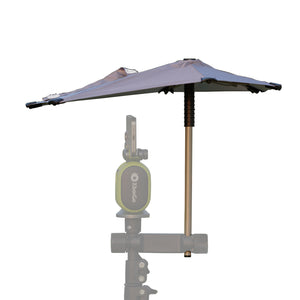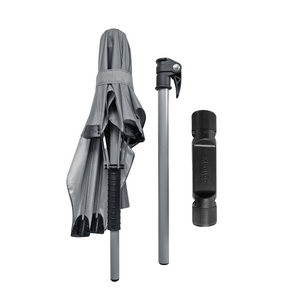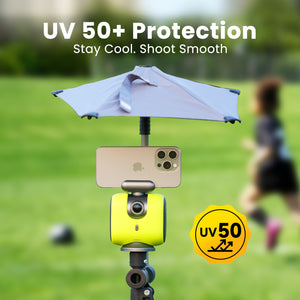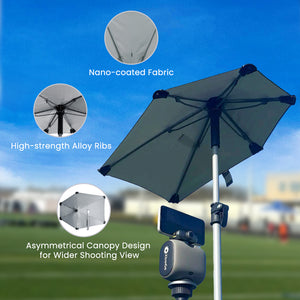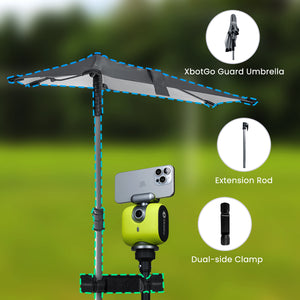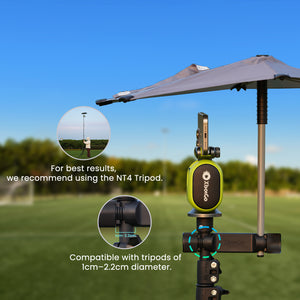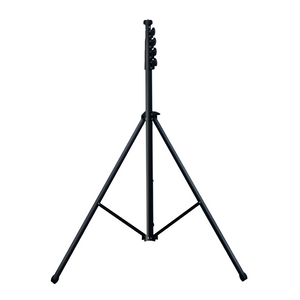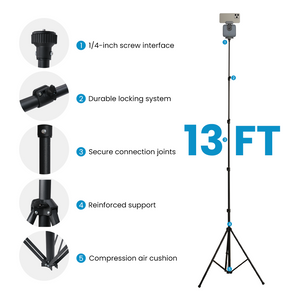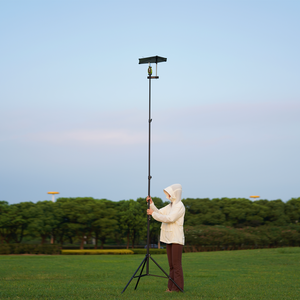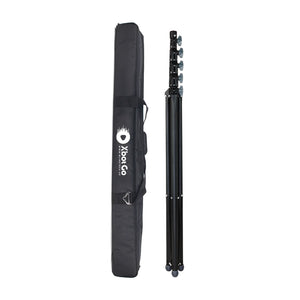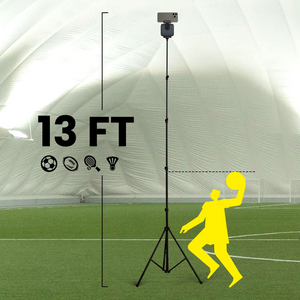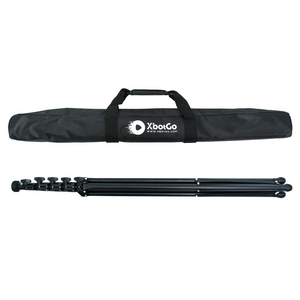XbotGo Chameleon AI Sports Camera
15 Best Soccer Games for Kids That Work
Getting kids excited about soccer while building essential skills can be challenging, especially when you're competing with video games and social media for their attention. Whether you're a parent, coach, or volunteer working with young players, having a toolkit of engaging soccer games can transform practice sessions from boring drills into memorable experiences that kids genuinely love.
After analyzing insights from experienced coaches, parent forums, and youth soccer communities, we've compiled the most effective soccer games that keep kids engaged while developing fundamental skills. These games have been tested by real coaches working with ages 4-12 and consistently deliver results in terms of skill development, engagement, and pure fun.
1. Red Light, Green Light (Soccer Edition)
Ages: 4-10
Skills Developed: Ball control, listening, reaction time
Setup Time: 2 minutes
This classic playground game gets a soccer twist that every kid instantly understands. Players dribble toward the coach with their ball, but must stop completely when "red light" is called. What makes this game special is how it naturally teaches close ball control under pressure.
How to Play:
- All players line up with balls at one end
- On "green light," players dribble toward the opposite end
- On "red light," players must stop their ball immediately
- Players who don't stop in time go back to the start
- First player to reach the coach wins
Coach's Secret: Move around the field during the game so players going "back to start" sometimes actually get an advantage. This keeps everyone engaged and prevents frustration. One experienced U6/U7 coach shared: "I also move around the field so even if someone has to go back to the start, sometimes it can benefit them."
2. Sharks and Minnows
Ages: 5-12
Skills Developed: Dribbling under pressure, spatial awareness, defending
Setup Time: 3 minutes
Coaches consistently rate this as their most effective game, but with a crucial modification that keeps all players engaged instead of eliminating them.
How to Play:
- One or two players are "sharks" (no balls)
- All other players are "minnows" (with balls)
- Minnows try to dribble from one end to the other
- If a shark kicks your ball away, you become a shark OR get an extra minnow teammate (coach's choice)
- Continue until time runs out
Why It Works: Unlike traditional elimination games, this version keeps everyone active and engaged throughout. As one coach explained: "Instead of having the players who lose their ball sit out, I assign them to be an extra shark or an extra minnow. This way, the minnows have someone to pass to and can keep the game going longer, or it's not just one shark against some really good minnows."
3. King of the Ring
Ages: 6-12
Skills Developed: Ball protection, defensive positioning, decision making
Setup Time: 1 minute
Using the center circle, this game creates intense but controlled competition that teaches players to protect their ball while trying to win others' balls.
How to Play:
- All players with balls inside the center circle
- Goal is to kick other players' balls out while protecting your own
- Once your ball is out, collect it and cheer from the sideline
- Last player in the circle is the "King"
- Play multiple rounds with different kings
Pro Tip: Emphasize that only one player can kick a ball at a time - this naturally reduces bunching and teaches positioning. The game helps develop spatial awareness and decision-making skills as players learn to protect their ball while looking for opportunities to attack others.
4. Simon Says (Soccer Skills)
Ages: 4-8
Skills Developed: Listening, following directions, various ball skills
Setup Time: 1 minute
Perfect for younger players who need structure and clear commands. This game builds listening skills while practicing ball control.
How to Play:
- All players dribbling with balls in a defined area
- Give commands like "Simon says stop with your left foot"
- Players only follow commands that start with "Simon Says"
- Add complexity with commands like "Simon says juggle the ball" or "Simon says pass to a teammate"
- Commands can include: stop the ball, change direction, left foot only, right foot only
Advanced Version: Use only hand signals instead of verbal commands for older players. This variation adds an extra challenge and helps players develop visual awareness.
5. Musical Balls
Ages: 5-10
Skills Developed: Ball control, quick thinking, acceleration
Setup Time: 2 minutes
Like musical chairs but with soccer balls, this game creates urgency and decision-making under pressure.
How to Play:
- All players dribbling in the area
- When coach yells "CHANGE!" players must leave their ball and find a new one
- Remove one ball each round
- Player without a ball does jumping jacks or runs laps (stays active!)
- Continue until 2-3 balls remain
Safety Note: Establish clear rules about not pushing other players when scrambling for balls. The focus should be on quick decision-making and ball control, not physical contact.
6. "Kick the Coach"
Ages: 5-10
Skills Developed: Dribbling with purpose, shooting accuracy, having fun
Setup Time: 1 minute
This game consistently produces the biggest smiles and most engagement according to the coach.
How to Play:
- Coach jogs around the area (not too fast for younger kids)
- Players dribble and try to hit the coach's legs with their ball
- When a player hits the coach, they dribble around the perimeter and try again
- Coach should let themselves get hit regularly to maintain fun
- Keep score of successful "hits"
Why Kids Love It: They get to "attack" the authority figure in a safe, fun way. One U7 coach reported: "Probably best session of the season so far. Lots of engagement and purposeful dribbling. During ending scrimmage players appeared more confident dribbling."
7. Don't Feed the Monkeys
Ages: 6-12
Skills Developed: Passing accuracy, intercepting, teamwork
Setup Time: 3 minutes
Creates a clear passing challenge with built-in defenders.
How to Play:
- Create a "monkey cage" with cones (center circle works)
- Two players are "monkeys" inside the cage
- 3-4 "zookeepers" stand around the outside trying to intercept
- Remaining players try to "feed" the monkeys by passing balls to them
- Switch roles every few minutes
- Each successful pass to a monkey earns a point
Coaching Point: Emphasize passing accuracy over power - this isn't about blasting the ball. The game naturally teaches players to look for passing lanes and weight their passes appropriately.
8. Four Goals
Ages: 7-12
Skills Developed: Shooting, quick decision making, competition
Setup Time: 4 minutes
This fast-paced game creates natural competition and lots of shooting practice.
How to Play:
- Set up four small goals in a cross pattern
- Place balls in the center
- Two players line up behind each goal
- On "GO!" first player from each team sprints to center, takes a ball, dribbles back, and scores
- Once they score, their teammate goes
- Team with most goals when balls are gone wins
Variation: Require players to shoot from behind a cone to work on shooting from distance. This adds an extra challenge and helps develop shooting power and accuracy.
9. Piggy in the Middle (Soccer Version)
Ages: 5-12
Skills Developed: Passing, receiving, defending
Setup Time: 1 minute
A classic that works every time and scales perfectly for different skill levels.
How to Play:
- Players form a circle with 1-2 "piggies" in the middle
- Circle players pass the ball around trying to keep it away from piggies
- If a piggy intercepts, they switch with whoever lost the ball
- Vary circle size and number of piggies based on skill level
- For younger players (3-5 years), start in smaller groups to maintain engagement
Progression: Start with hands only for very young players, then progress to feet only. This game helps develop ball control and passing skills while building confidence.
10. Cops and Robbers
Ages: 6-12
Skills Developed: Dribbling under pressure, defending, teamwork
Setup Time: 3 minutes
Creates clear roles and objectives that kids immediately understand.
How to Play:
- Set up a "jail" area with cones
- 2-3 players are "cops" (no balls)
- All others are "robbers" (with balls)
- Robbers try to dribble from one end to the other
- If caught, robbers go to jail
- Other robbers can free jailed teammates by dribbling past the jail
- Switch roles regularly
Advanced Version: Give cops balls too and require them to dribble while chasing. This adds complexity and helps develop multi-tasking skills.
11. Tic-Tac-Toe
Ages: 6-12
Skills Developed: Speed, decision making, teamwork
Setup Time: 4 minutes
Combines strategy with physical activity.
How to Play:
- Create a large tic-tac-toe grid with cones
- Divide into two teams with different colored pinnies
- Teams line up 15-20 yards from grid
- Players run to place their pinnie, then run back to tag teammate
- First team to get three in a row wins
- Restart immediately for multiple rounds
Soccer Twist: Players must dribble a ball to their square instead of just running. This adds ball control to the decision-making element.
12. Freeze Tag
Ages: 4-10
Skills Developed: Dribbling, helping teammates, awareness
Setup Time: 2 minutes
Teaches players to be aware of teammates while maintaining ball control.
How to Play:
- 1-2 players are "it" (with balls)
- All others dribble trying to avoid being tagged
- When tagged, player freezes with legs spread and ball overhead
- Other players can unfreeze them by passing a ball through their legs
- Switch taggers regularly
- Anyone going out of bounds must freeze
Variation: Frozen players can unfreeze themselves after 10 toe-taps on their ball. This keeps everyone engaged and practicing skills even when "frozen."
13. Traffic Light Soccer
Ages: 4-8
Skills Developed: Ball control, listening, following directions
Setup Time: 2 minutes
Perfect for very young players who need clear, simple commands.
How to Play:
- Green = dribble fast
- Yellow = dribble slow
- Red = stop with foot on ball
- Add complexity with "right turn signal" (right foot only) or "reverse" (pull ball backward)
- "U-turn" = turn 180 degrees
- "Parking" = stop ball at nearest cone
Parent Favorite: Kids can practice this at home in the backyard or driveway, making it perfect for skill development between practices.
14. Tunnel Soccer
Ages: 4-8
Skills Developed: Shooting accuracy, following instructions
Setup Time: 1 minute
Especially effective for very young players who need clear, achievable goals.
How to Play:
- Coach or parent stands with legs spread as a "tunnel"
- Players line up 5-10 feet away with balls
- Players take turns trying to kick ball through the tunnel
- Make it competitive by counting successful shots
- Let kids be the tunnel too
- Can progress to passing through moving tunnels
Why It Works: Very clear success/failure criteria that kids understand immediately. The visual target helps develop accuracy and proper passing technique.
15. Color Cone Dash
Ages: 4-10
Skills Developed: Listening, ball control, direction changes
Setup Time: 3 minutes
Creates controlled chaos that kids love while teaching directional dribbling.
How to Play:
- Place different colored cones around the area
- All players dribble in the center
- Call out a color - everyone dribbles to that color
- Call out a color that isn't there to see if they notice
- Add complexity by calling two colors or "any color but red"
- Can progress to calling shapes or numbers
Engagement Trick: Let kids take turns calling out the colors. This gives them ownership and keeps everyone focused.
Essential Tips for Running Successful Soccer Games
Keep It Moving: Young children have short attention spans. If a game isn't working, move on quickly. Aim to change activities every 5-10 minutes for younger groups.
Celebrate Everything: As experienced coaches emphasize, "celebrate all effort, rarely ever celebrate result." This builds confidence and keeps kids coming back.
Turn Everything Into a Game: Even setting water bottles down can become a race or challenge. This maintains engagement throughout the entire session.
Laugh Often: Kids respond to energy and enthusiasm. Don't be afraid to be silly, make mistakes, and laugh at yourself.
Focus on Development, Not Winning: At young ages, the goal is to develop a love for the game, not create perfect players. When kids enjoy soccer, skill development follows naturally.
Age-Appropriate Considerations
Ages 4-6: Focus on individual ball skills, following simple instructions, and having fun. Expect "herd ball" and celebrate small victories like stopping the ball on command.
Ages 7-9: Begin introducing more complex games with multiple rules. Players can start understanding basic positioning and teamwork concepts.
Ages 10-12: Add competitive elements and strategy. Players at this age can handle criticism better and enjoy more challenging scenarios.
Making Every Practice Count
The most successful youth soccer programs share one common trait: they prioritize fun and engagement over rigid skill development. These 15 games have been proven effective by thousands of coaches and parents because they naturally teach skills while keeping kids laughing, learning, and loving the game.
Remember that the goal at young ages isn't to create perfect players - it's to create kids who can't wait for the next practice. When you achieve that, skill development follows naturally, friendships form, and you create memories that last a lifetime.
Start with 2-3 of these games in your next session and watch how quickly your players' engagement and skill levels improve. The beautiful game has never been more beautiful than when played by kids who are having the time of their lives.
XbotGo Chameleon AI Sports Camera
Capture every moment with AI-powered tracking. Perfect for coaches, parents, and athletes who want seamless footage without manual filming.








 Soccer
Soccer Basketball
Basketball Ice Hockey
Ice Hockey Football
Football Handball
Handball










